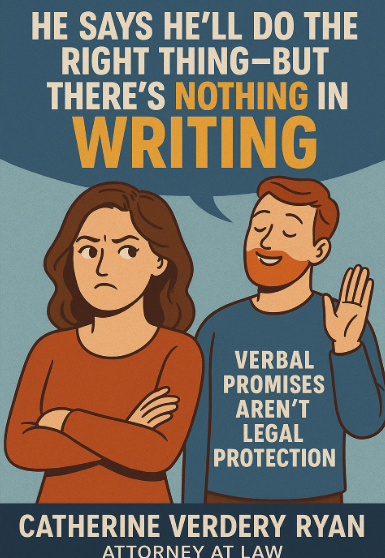“I trust him.”
That’s what a lot of clients say in the beginning. And truthfully? You probably have every reason to believe that your ex—or soon-to-be ex—means well. But even the most well-meaning promises can disappear when circumstances change. That’s why having nothing in writing is a mistake you can’t afford.
Let’s talk about what “doing the right thing” actually looks like… legally.
Intentions Aren’t Legally Binding in Georgia
In Georgia, verbal agreements around custody, support, or asset division carry almost no legal weight. So even if someone says they’ll pay child support, split the bills, or let you keep the car—unless that promise is put into a written, signed, and filed agreement with the court, it’s just that: a promise.
And promises don’t pay the bills.
When Good Intentions Disappear
Here’s what often happens:
- He agrees you can keep the house—but then loses his job and wants half.
- He swears he’ll keep paying daycare until the baby starts school—but gets a new girlfriend and suddenly says it’s “not his problem anymore.”
- He tells you not to worry about the car note—but then stops paying, and your credit tanks because it’s still in your name.
None of this makes him evil. It just makes him human—and humans change their minds, especially when finances, relationships, or egos get involved.
You’re Not “Expecting the Worst.” You’re Protecting the Best.
Let’s get one thing clear: Putting it in writing isn’t about mistrust.
It’s about clarity. Boundaries. Peace of mind.
Think of it like insurance. You don’t expect your house to burn down, but you still get coverage. A written legal agreement works the same way. If everyone follows through, perfect. If they don’t, you’re protected.
Real Talk: Verbal Agreements Don’t Work in Court
If you ever have to go back to court to enforce custody, support, or property division, the judge isn’t going to say:
“Well, he said he would. That’s good enough.”
Nope.
They’ll ask:
- Where’s the signed agreement?
- Was it notarized and filed?
- Is it part of a court order?
Without that, you’re starting from scratch—and your leverage just went out the window.
How to Get Things in Writing
Worried that asking for a written agreement will blow everything up? It won’t—if it’s handled professionally. A lawyer can help you:
- Create a neutral, fair, and legally sound agreement
- Keep things calm by communicating directly with the other party or their attorney
- Avoid court time by getting everything signed and filed in advance
In fact, when done right, legal documentation can keep your relationship less tense—not more.
It’s Not About Trust. It’s About Truth.
He might love his kids. He might genuinely want to help.
But even the best intentions need legal structure.
Because what happens when life changes? A new job, a new partner, a new priority?
Without a written agreement, you’re left holding nothing but words—and those fade fast.
📞 Need Help Turning Promises Into Protection?
Whether you’re finalizing a divorce, navigating custody, or just starting separation conversations, Catherine Verdery Ryan can help you create legal agreements that stick.
- Uncontested Divorce
- Legitimation & Custody
- Child Support & Modifications
- Alimony & Property Division
📍 Serving Richmond, Columbia, Burke, and surrounding Georgia counties
🔗 catherineryanlawyer.com
📞 (706) 722-2663

